Articles Menu
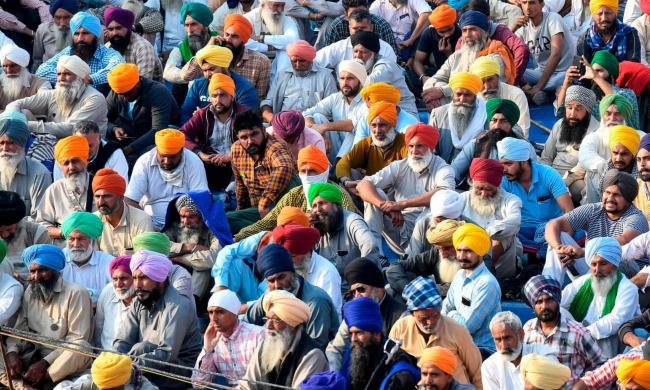
Dec. 11, 2020
hen the sacks were ripped opened, almonds poured out, more than 10,000kg of them. It was not the first donation that had been sent to the Indian farmers defiantly camped out along the periphery of Delhi. In previous days trucks had rolled up and disgorged sacks of rice, pulses, flour, vegetables, sugar, tea and biscuits.
“This is food being sent by supporters from all over India and from as far as England and Canada. There is no shortage of food. We have enough to eat for months,” said Jaswinder Pal Singh, a farmer from Punjab.
Now in its 15th day, a protest by mainly Sikh farmers from Punjab and Haryana against the government’s plan to liberalise the agricultural sector shows no sign of losing its boisterous energy.
Hundreds of thousands of farmers, many gnarled and weather-beaten with white beards, have laid siege to the Indian capital. They are refusing to be moved until the new laws are repealed.
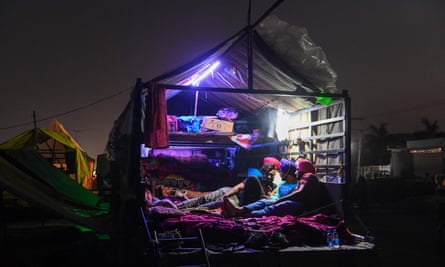
The farmers arrived in convoys of tractors with attached trolleys, usually used for transporting crops but now re-purposed as temporary homes alongside the police barricades.
A trolley serves as a bedroom, piled with blankets and bundles of clothes hanging off hooks. The sides of the trolley serve as washing lines and spaces around the tractors, shielded by tarpaulin sheets, have become sitting area where the farmers chat and rage against the reforms.
With talks between agriculture leaders and the government at a continued deadlock, the farmers know it could be a long haul, possibly months, so they have made arrangements for regular hot meals.
At Singhu, one of three sites on the periphery of the Indian capital where the farmers have stationed themselves, meals and snacks are being cooked at all times of the day and tea is brewed in gigantic cauldrons and vats.
Protesters wake up to tea and potato fritters. Lunch is rice, dal and vegetables. Afternoon tea is accompanied by biscuits and rusks. Dinner is a full meal rounded off with kheer, an Indian rice pudding.
A laundrette has opened its doors to offer free washing-machine use for the farmers, and a shopping mall has allowed its power points to be used for recharging mobile phones.
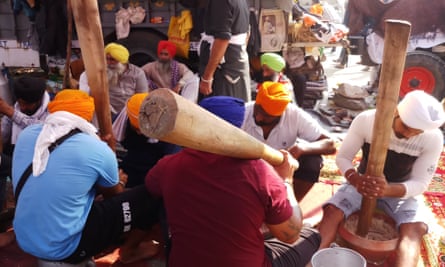
At another site protest, at Ghazipur, an NGO has set up a makeshift library with books and magazines on farming and social issues. It is proving popular with the younger protesters – young, educated Sikhs who have followed their fathers into farming, despite the small landholdings, due to a lack of other employment opportunities.
These are citizens of the land, not of politics, but many now say that India’s prime minister, Narendra Modi, radically underestimated their determination and resilience, and could now have met his match.
“It is my land. I am the owner. What makes Modi think he can take decisions on my behalf? At least he should have consulted us, the very least he could have done,” said Singh.
The agriculture sector, which employs almost half of Indians but adds only 15-16% to India’s GDP, is plagued by archaic practices and inefficiency. Tens of millions of farmers struggle to make a living, and the suicide rate in the agricultural sector is rated as one of the highest in the world.
Modi argues that the reforms, which were passed in September, were long overdue. He assured farmers that the laws would modernise agriculture as well as attract investment, and give farmers more income by granting them greater choice over whom to sell to.
However, while most farmers are in agreement that their sector is in dire need of reform, they say these laws will not only leave them at the mercy of big corporations, but will mean they earn less for their crops and could risk losing their land. They are also enraged by the lack of consultation with the farming unions and leaders.
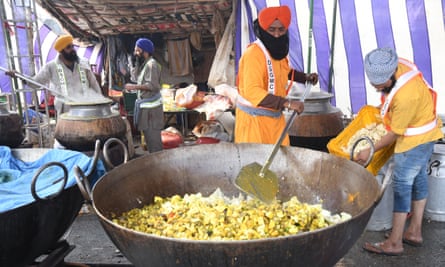
Though the government made several significant concessions on Wednesday, including a promise to retain a guaranteed price, the farmers have rejected the deal. Farmers say they could intensify the agitation next week and block all the highways to Delhi, a move that would disrupt food and medical supply deliveries to the capital.
“We have left our families back home. They are waiting for us. We’re not enjoying living out in the open like this. But we won’t go back empty-handed,” said Manjit Singh from Ludhiana, who has camped at Singhu since the protest’s first day.
There have already been 15 deaths and as winter temperatures begin to drop, farmers acknowledge the going may get even tougher, particularly during the nights. Volunteer doctors have set up stalls to treat those with ailments. But fever, colds and aches are already commonplace.
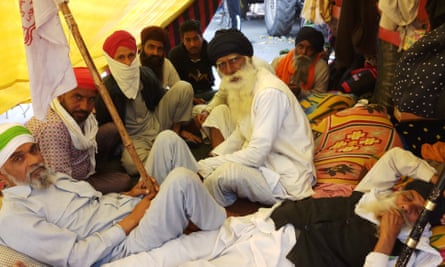
Elderly people, in particular, are struggling with the discomfort. Their joints ache. Their blood pressure fluctuates. “It upsets me that elderly farmers have been made to sleep on the ground in the open by this government simply to protect their rights,” said Dr Amarjit Singh.
In the densely populated camp, coronavirus appears not to be a cause for concern, and a misplaced sense of machismo means that hardly anyone wears a mask.
“We don’t need to worry about coronavirus,” said Satbir Singh, flexing his arm. “We are strong from all the physical work we do in the field. We won’t get the virus.”
For now, the farmers’ resilience is unbroken and their appetites are content. A group of muscular young men sit in rows and begin grinding the kilos of almonds that were delivered earlier. The paste, which is mixed with milk in metal bowls, will be handed out, they said, to “keep farmers strong and fit to keep up the protest”.
[Top photo: Protesting farmers listen to a speaker at the Delhi-Haryana state border in Singhu . Photograph: Prakash Singh/AFP/Getty Images]